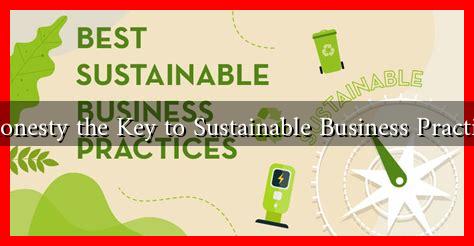-
Table of Contents
Is Honesty the Key to Sustainable Business Practices?
In an era where consumers are increasingly aware of environmental and social issues, businesses are under pressure to adopt sustainable practices. However, the question arises: is honesty the cornerstone of these sustainable business practices? This article explores the relationship between honesty and sustainability, examining how transparency can lead to long-term success for businesses.
The Importance of Honesty in Business
Honesty is often touted as a fundamental value in business. It fosters trust, builds relationships, and enhances a company’s reputation. In the context of sustainable business practices, honesty plays a crucial role in several ways:
- Building Trust: When companies are transparent about their practices, consumers are more likely to trust them. This trust can lead to customer loyalty and repeat business.
- Enhancing Reputation: A reputation for honesty can differentiate a company in a crowded market. Brands like Patagonia and Ben & Jerry’s have built their identities around transparency and ethical practices.
- Encouraging Accountability: Honest reporting on sustainability efforts holds companies accountable for their actions, pushing them to improve continuously.
Case Studies: Honesty in Action
Several companies have successfully integrated honesty into their sustainable practices, demonstrating the benefits of transparency.
Patagonia
Patagonia, an outdoor clothing brand, is renowned for its commitment to environmental sustainability. The company openly shares its supply chain practices, including the sourcing of materials and labor conditions. Their “Worn Wear” program encourages customers to repair and recycle their clothing, promoting a circular economy. This honesty not only enhances their brand image but also resonates with environmentally conscious consumers.
Unilever
Unilever, a multinational consumer goods company, has made significant strides in sustainability through its Sustainable Living Plan. The company publishes annual reports detailing its progress towards sustainability goals, including reducing greenhouse gas emissions and improving water efficiency. By being transparent about its challenges and successes, Unilever has built credibility and trust with stakeholders.
The Role of Transparency in Consumer Behavior
Research indicates that consumers are increasingly favoring brands that demonstrate honesty and transparency. A 2021 survey by Label Insight found that:
- 94% of consumers are likely to be loyal to a brand that offers complete transparency.
- 73% of consumers are willing to pay more for products that offer complete transparency.
- 57% of consumers would change their purchasing habits to help reduce negative environmental impact.
These statistics highlight the growing demand for honesty in business practices. Companies that embrace transparency not only attract more customers but also foster a loyal customer base that values ethical practices.
Challenges of Maintaining Honesty
While the benefits of honesty in sustainable business practices are clear, challenges remain. Some of these include:
- Fear of Backlash: Companies may hesitate to disclose negative information about their practices for fear of damaging their reputation.
- Complex Supply Chains: Many businesses struggle to maintain transparency throughout their supply chains, making it difficult to provide accurate information.
- Greenwashing Risks: Companies may be tempted to exaggerate their sustainability efforts, leading to accusations of greenwashing if they are not honest.
Conclusion: The Path Forward
In conclusion, honesty is indeed a key component of sustainable business practices. Companies that prioritize transparency not only build trust and loyalty among consumers but also position themselves for long-term success. As the demand for ethical and sustainable practices continues to grow, businesses must embrace honesty as a core value. By doing so, they can navigate the challenges of sustainability while fostering a positive impact on society and the environment.
For more insights on sustainable business practices, you can visit Sustainable Business.


